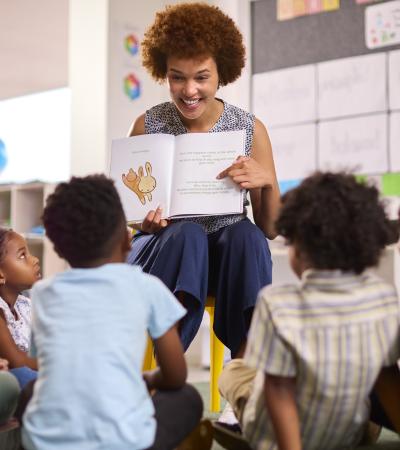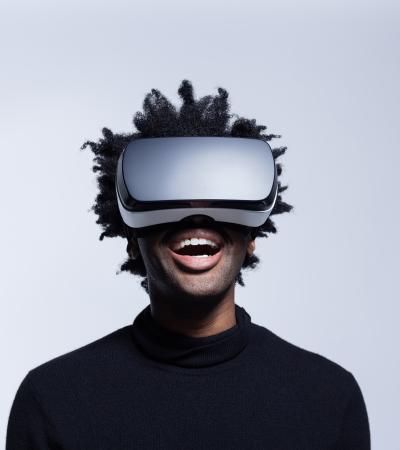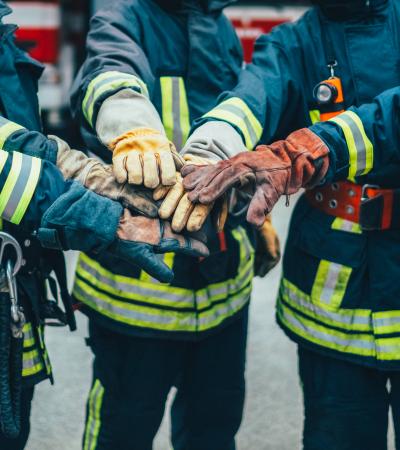Mackenzee Grzesiak, reference librarian at Alpha Park Public Library in Illinois, was watching HBO’s "Last Week Tonight with John Oliver" when she connected her work on the library’s podcast to the episode’s coverage of America’s current mental health crisis.
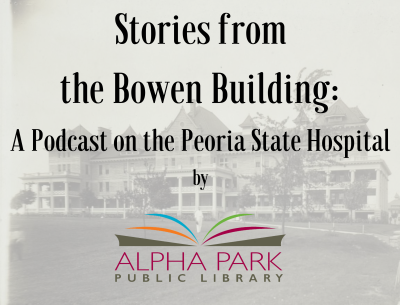
“Oliver was talking about how mental health services in the U.S. are at full capacity right now and don’t provide sufficient or specialized care,” says Grzesiak. “He talked about how many institutions were shut down a few decades ago and nothing ever came along to adequately replace them. It got me thinking about Peoria State Hospital, the subject of our library’s podcast.”
Funded by ALA’s American Rescue Plan: Humanities Grants for Libraries, Alpha Park Public Library’s “Stories from the Bowen Building” dives into the fascinating history of the Peoria State Hospital, which closed in 1973. “We didn’t set out to shine a light on mental health,” Grzesiak says, “but with mental health being such an important topic right now, the podcast project couldn’t have come at a better time.”
Part oral history and part advocacy, the podcast shares first-person accounts of how the institution played an important role in the history of the community and in the humane housing and treatment of people with mental illness.
Grzesiak, along with outreach librarian and interim director Heidi Rhea, spoke with me about the podcast and why preserving the stories of the hospital will benefit the wider community.
Why did you select Peoria State Hospital as the topic for your podcast?
Rhea: The initial goal of the podcast was to incorporate our community’s aging population back into the fold since the pandemic dismantled many socialization networks. And, many older people in our area worked for Peoria State Hospital when it was open.
Grzesiak: Many of our patrons and locals know about the hospital and the hospital grounds. There are a lot of interconnected stories from those who worked there that we wanted to tell. Since they are getting older now, mostly in their 70s, 80s, and 90s — we just interviewed a 101-year-old, too! — they felt very appreciative of us reaching out to them and asking for their stories.
Rhea: The Peoria State Hospital is the perfect topic for a podcast because it’s the story of a community coming together to take care of one another. It’s evident that the interviewees never lost the compassion they had for their work and their patients. The hospital was a huge part of their own stories and the wider story of our community. These people were pioneers of mental health!
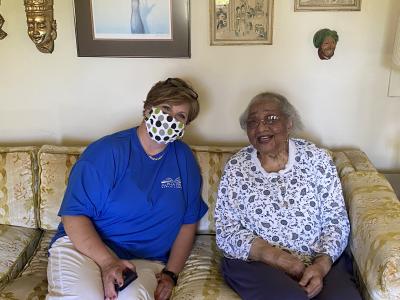
How was the hospital a pioneer of the mental health field? Did you learn anything new when speaking with the interviewees?
Grzesiak: Despite how this type of hospital – which was then commonly referred to as an “insane asylum” – was viewed, Peoria State Hospital was totally different from what one might picture a mental health institution from the early 20th century to look like.
Patients at Peoria State were not locked up, sedated or restrained. It was funded by the Peoria Women’s League, and the doctor who founded the facility, Dr. George Zeller, provided humane treatment that was unseen at the time. His impact and humane treatment methods lasted decades after his passing, until the hospital closed in the 1970s.
Rhea: Today, when we want to look back and learn about the history of this institution, we are mostly met with the supernatural. Because it’s an old building that is still standing, alleged spirit sightings have made the building a tourist spot for ghost hunters.
We want the podcast to shed light on the good work that came out of the building and prioritize the stories of the patients and staff over the supernatural stories. We need to get these real stories down and clarify that what happened there was not torture or anything like that, but those in the building were a family of staff and patients that were given groundbreaking mental healthcare.
The podcast is coming full circle with today’s mental health crisis. Dr. Zeller’s philosophy was very one-on-one and purposeful. Today, it looks like we have come to the point where it is rare for patients to find a treatment that is personalized. It’s like we need another pioneer like Dr. Zeller.
Grzesiak: A heartwarming thing that came from this podcast was the perspective shared from all those interviewed about how much they cared for their patients. It’s evident the major impact the institution had and continues to have on the community. Previous staff still clearly remember patients and share hilarious, beautiful and sad stories.
I want listeners of the podcast to change the way they feel or think about institutions from that time. It will hopefully allow us to bring more humanity to the way we discuss the mental health epidemic of today.
I can’t wait to hear the full series! You worked with some high school interns. How did they get involved?
Rhea: We wanted this project to be intergenerational to bring us back to that initial goal of engaging our aging population. Our three high school interns came up with their own questions and conducted their own interviews.
We had someone come in to teach them proper interview skills. These lessons, paired with conducting their own interviews for the recording and sitting in on interviews, was a huge training for them. They learned practical skills that they will use forever.
Getting young community members involved is a great thing, and the older interviewees felt very honored by the recognition.
Let’s talk about the production that is making a podcast. How did you get started?
Rhea: We started by working with a podcast consultant to come up with a plan on how we were going to form the episodes. We didn’t want this to be a straight interview audio of rambling, so we had to learn how to combine our interviews with narration to make it meaningful.
Grzesiak: We had to figure out how to best form our questions to be compelling. Once we did the first couple of interviews, we were able to come up with questions that would help form our episode structure. We realized that people really focused on a few topics, and those few topics became our episodes.
Rhea: My advice would be to let your interviewee guide the conversation and ask open-ended questions.
Grzesiak: Logistic-wise, it was decided early on that Heidi would ask the questions. I provide the opening and closing voiceover and handle the recording and editing. Our library’s facilities manager, Devin Flanagin, is a professional audio engineer, so he does the mixing and mastering of each episode. For equipment, we bought MacBooks and use Logic Pro for the editing.
What logistical tips would you share for libraries that want to start podcasting?
Grzesiak: A tip would be to make sure your deadlines for interviews and publishing episodes are flexible!
We will be sharing all the episodes on our website, AlphaPark.org, Spotify, Apple Podcasts, and many other platforms automatically through one website, Buzzsprout. We also will have MP3 players available for checkout so that patrons who don’t have internet access or aren’t tech savvy with podcasts can listen.
Rhea: For libraries that don’t have a Devin on staff to do the mixing and mastering, consider hiring a podcast consultant for one or two sessions to help with editing and other advice. You can also look directly into your community, like finding high school students who can help with interviews and editing. Once we complete the podcast, we want to make the podcast equipment available for patron use and possibly have programs that teach Podcasting 101.
Every community has a story to tell and there are tons of people out there waiting to be listened to, especially the older community, whose stories we shouldn’t lose. I would advise libraries to document these stories through podcast so they don’t get lost, and they can be accessible and entertaining to different age groups.
Funding for this article has been provided by the National Endowment for the Humanities (NEH) as part of the American Rescue Plan: Humanities Organization Grant.

